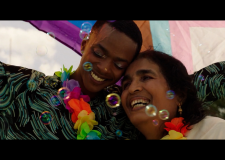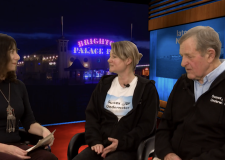Brighton & Hove Health and Social Care Services Urged to Have a Rethink
Campaigners are urging health and social care services to have a rethink. Frank le Duc reports

Parents of children with disabilities and special needs across Brighton and Hove have been working together to raise awareness of the difficulties that they face dealing with health and social care services. Three campaigners recently produced a report about the experiences of many of those children and their parents and carers. And they provided some moving examples of common frustrations.
The three were Rachel Travers, the chief executive of Amaze, a charity which supports such parents, Debbie Collins, the parent participation officer at Amaze, and Amanda Mortensen, the chairman of the Parent Carers’ Council (PaCC). They shared their findings and their recommendations with councillors at Hove Town Hall.
Their report, Talk Health, said: “Nothing prepares you for the journey you begin when you have a child with a disability. Due to their complex health, mental health and wellbeing needs this group of children use a wide array of health services.
“Disabled children’s interaction with a wide range of health services can be intensive, extensive and expensive: they are high cost, high incident users of health services.
A range of different health services are required including universal services (such as GPs), specialist services (such as specialist neurology services) and condition specific services (such as a service for children with visual impairment).
“Health professionals from across acute, primary care, specialist services, palliative care and community-based services must actively seek the views of these young patients, and those
of their parent carers, if they are to ensure that their experience of health services are as positive as possible. We have sought the views of parent carers who use health services extensively in order to create this report which we hope will help to improve the efficiency and quality of the health services from the perspective of children with disabilities and special needs.
“For instance, children with disabilities and complex health needs and their families may have used A&E services at all times of the day or night and can provide expert views on what could be improved more than the occasional users. We hope that by addressing the concerns of parent carers, the following outcomes could be achieved:
• More efficient use and targeting of scarce health resources
• Improved quality and ‘fit’ of service
• Greater user satisfaction with services and fewer complaints
THE TOP THREE KEY AREAS ARE:
Further improving
Parent Participation:
“The parent carer voice needs to be represented at the highest level in order to ensure that services are as good as they can be for disabled children and their families. The Care Quality Commission’s (CQC) review of services for disabled children showed that there were few care plans across Sussex with little information about waiting time for therapies but that Brighton and Hove was the only area with ‘adequate involvement of children and families in assessments, inductions and training’. This is very positive and can be built upon.
“The voice of parent carers needs representation on the new Health and Wellbeing Board, Children’s Committee and Clinical Commissioning Group’s Children’s Review Board. The PaCC needs increased financial support to ensure that it continues to carry out its vital participation work and reach new further marginalised groups of parents in the city.
“We believe that Public Health should match the investment in PaCC that the PCT/CCG (Primary Care Trust/Clinical Commissioning Group) makes in order to continue this very valuable work, and that the new CCG should continue this funding at a higher level, if possible, to reach families who face multiple disadvantage and face health inequalities. There needs to be better evaluation of health services. Parent carer feedback could be standardised across all health services.”
Increased resource for services:
“The need for increased community support is a strong theme throughout health services.
A specialist paediatric epilepsy nurse would be cost effective in the long run, reducing stays in hospital and greatly reducing stress levels in family members looking after children with very complex epilepsy. The community nursing team is under resourced, and there are only two specialist health visitors, who provide vital ‘early’ support. Also, the disability liaison nurses in adult services are making a huge difference to the experience of adults with learning difficulties in hospital. The same post for paediatrics would greatly improve the experience of young people and their families in hospital.
“This would reduce complaints and even reduce hospital stays as this valuable professional can give advice over the phone too. Many parents play a ‘keyworker’ role in their child’s health care and this should be recognised and supported with increased access to resilience training. For those families who do not feel able to play this role, a keyworker is needed and this will become even more vital with the implementation of the new single Education, Health and Care Plan.
Improved communication and transparency:
“It is frustrating to see that after five years of review, access to therapies is still a huge problem for many children and waiting times are still unacceptably long. There needs to be a citywide code of practice for GPs and young people in transition. Parent journey training (taken up by some professionals) should be made mandatory for all professionals, including consultants.
“This would greatly improve communication between health professionals and families and reduce complaints. Communication needs to be improved between the multitude of health professionals involved in children and young people’s lives. Parent carers should be routinely copied in to any correspondence about their young person and should be routinely given details of eligibility criteria and waiting times.”
WHAT PARENTS SAID
“This year, my child has seen two community paediatricians, a gastroenterologist, a neurologist, an occupational therapist, a physiotherapist, a speech and language therapist, a dietician, a ketogenic diet team, a geneticist, a surgeon, a school nurse, a community nursing team, several different teams of doctors and nurses at the children’s hospital, ten different paramedics and her GP. She has attended medical appointments or hospital visits over 40 times.”
“My son is on the autistic spectrum and is very anxious. They [the Royal Alex] had really thought through the whole experience. They had an extra member of staff to help and had his favourite DVD poised to play as they took the blood.”
“I have a child with mental health problems. CAMHS (Child and Adolescent Mental Health Services)? Where can I begin? It takes far too long from point of referral to actually seeing someone, even if your child is really quite poorly. They take stance of it being a family problem as opposed to a medical one or with the child. I have found psychiatrists quite arrogant and often not up to date with the latest developments. I had to make a formal complaint and see a third psychiatrist from another county before I got anywhere. This psychiatrist said that that my son should have had a proper care plan from the outset. It is the most stressful and exhausting experience I have ever encountered.”
“CAMHS has really taken on board everything that has been said by parents and their stories all correlate with each other. So hopefully we will see some improvements.”
“OT (occupational therapy) is particularly hard to get. My child has cerebral palsy and severe epilepsy and we still struggle to get any advice about what do at home. The only service we get is that they advise school on a termly basis. We have sourced and paid for all our equipment apart from his commode. We would benefit from advice on exercises that would help with my son’s self help skills.”
“My GP is very helpful but there is little recognition of the emotional and mental problems that go with a disability, both for the young person and the parent. Also, appointment times are too short when your child has such complex difficulties.
A MOTHER WRITES: PAULA DONOVAN
I’m a member of a parent-led group Mascot (Managing Autistic Spectrum Conditions Online Together). We have more than 80 families in Brighton and Hove with children somewhere on the autistic spectrum. Most are in mainstream schools. We meet up and share information via a forum which is a lifeline for many.
Sadly many of us face daily difficulties accessing appropriate support in schools, NHS or social care services. When we realised the difficulties were common across the group we wanted to take action. We’ve spent the last year defining the problem areas and coming up with some inexpensive recommendations, meeting MPs and councillors to raise awareness and to ask for change.
We highlight the need to get it right for children so they can grow into independent adults and save the money that is currently being spent on crisis intervention services when autistic adults fall through the gaps or are left to fail.
We are very keen not to just complain but to be facilitators of change. We know there is little funding but feel with a better partnership approach – working with families rather than managing them – we will be able to successfully share our extensive knowledge with our services.
We see how existing resources are not being used effectively. We’re frustrated but enthusiastic about wanting to work with care providers to help redesign, develop and implement better ways of working. We’re innovative and up to date. We research and where possible trial good practice and have working links with the University of Sussex, Goldsmiths and South Bank research departments.
Sadly so far we are finding our attempts to work with local providers rather unwelcome – the door seems shut, another example of the ‘institutional inertia’ that Paul Burstow, the former Care Services Minister, was quoted as saying, but we are not deterred.
Our aim is to make Brighton and Hove and Sussex as a whole a beacon of good practice for autism if we can persuade our providers and commissioners to listen to us.
For more details email Mascot chairman Sam Bayley on sambay66@yahoo.com
Paula Donovan has a 13-year-old autistic son.





















